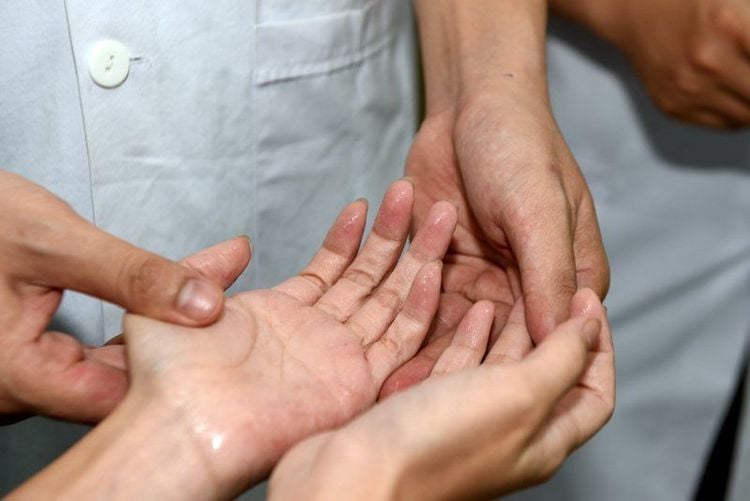1. What is the disease of sweating hands and feet?
Continuous sweating of hands and feet, anytime, anywhere, makes you feel uncomfortable and annoyed, it is very likely a sign of hyperhidrosis due to autonomic nervous system disorder, also known as sympathetic nervous system. Primary sweating of hands and feet often starts when you are in school age and tends to be hereditary in the family. As you grow up, this condition will increase and sweat in many other locations such as the armpits, back, head and face, etc. However, sweating of hands and feet can also be a symptom of other diseases such as hyperthyroidism, poisoning, etc.
Sweating of hands and feet does not affect the patient's health, but makes them extremely uncomfortable and tired, greatly affecting the patient's daily life, work and study. Because the hands are used a lot in work, social communication. Excessive sweating of hands and feet leads to limitations in career choices, as well as making the patient feel self-conscious when communicating.

2. Causes of sweating hands and feet
Primary sweating of hands and feet is caused by autonomic nervous system disorders, is more common than secondary sweating and is mainly located in the palms, soles, armpits, head and face. Sweating of hands and feet begins in childhood or pre-puberty, symptoms become more severe during puberty and last throughout life. In addition, neurological disorders and mental states also cause sweating of hands and feet.
Secondary sweating often causes sweating of the whole body. Some causes of secondary sweating of hands and feet are:
Vitamin and mineral deficiency: Vitamins and minerals play a very important role in the body. The lack of nutrients, vitamins and minerals due to the patient using a lot of processed foods containing many preservatives will be the cause of sweating of hands and feet in the cold season.
Hyperthyroidism: metabolic reactions in hyperthyroidism will be disrupted when the thyroid gland is overactive, causing the body to burn more calories, generate more heat and the body to secrete more sweat. In cases where patients have increased sweating in their hands and feet due to hyperthyroidism, there are often accompanying symptoms such as: nervousness, palpitations, hand tremors, rapid weight loss, bulging eyes, etc.
Secondary hyperhidrosis: due to too low a temperature, frostbite, pituitary tumors, aplastic anemia, tuberculosis, etc.
Poisoning: due to the nature of work or some other causes that cause your body to come into direct contact with toxic chemicals from water, air, polluted environment, etc., causing the body to be poisoned. At this time, the body will react by secreting more sweat to eliminate toxins from the body.
In addition, many studies have shown that patients with sweaty hands and feet in the cold season can be an early sign of leukemia. This is one of the malignant leukemias that disrupts the body's activities, especially the excretory activities, causing the body to experience increased sweating of the hands and feet.

3. What are the harmful effects of sweaty hands and feet?
Hands and feet are always wet, cool or cold all day long. In some cases, the patient also feels that their hands change color. Excessive sweating on the soles of the feet can lead to smelly feet. In addition, excessive sweating of the hands causes moisture, peeling of the skin and is susceptible to fungal infections.
Sweaty hands and feet do not affect the patient's health, but it causes major impacts on life such as:
Excessive sweating of the hands and feet makes the patient lack confidence and shy when interacting with others. In addition, excessive sweating can cause unpleasant odors on the patient's body, greatly limiting the patient's communication.
Excessive sweating makes the patient susceptible to psychological inhibition, irritability and affects daily life as well as work.
In addition, increased sweating of hands and feet can also be the initial symptom of some diseases such as: Hyperthyroidism, vitamin and mineral deficiency, poisoning, aplastic anemia, tuberculosis, pituitary tumors, frostbite due to low temperature, etc. If these diseases are not treated early, they can affect the patient's health.
In short, sweating of hands and feet can be caused by autonomic nervous system disorders or a symptom of some diseases such as hyperthyroidism, poisoning, endocrine disorders, etc. Sweating of hands and feet does not affect health but has a significant impact on life and work. Treatment of sweating of hands and feet depends on the cause. Secondary sweating of hands and feet requires complete treatment of the diseases. Primary sweating due to autonomic nervous system disorders will be treated by sympathetic ganglion burning.
At Vinmec International General Hospital, hyperhidrosis caused by autonomic nervous system disorders is treated by endoscopic sympathetic ganglionectomy, to reduce hyperhidrosis of the hands and feet, and is performed by experienced doctors with modern equipment. Patients will be screened before surgery, examined, and monitored after surgery according to international standard treatment protocols. Surgery to treat hyperhidrosis of the hands and feet by thoracic endoscopy has given outstanding results: Immediate effectiveness, one-time surgery for long-term effects, high aesthetics, safety, and short hospital stay. The advantages of endoscopic sympathetic ganglionectomy are low cost, short hospital stay, drier hands and feet after surgery, early and convenient return to daily activities, and increased patient confidence.
To arrange an appointment, please call HOTLINE or make your reservation directly HERE. You may also download the MyVinmec app to schedule appointments faster and manage your reservations more conveniently.
To arrange an appointment, please call HOTLINE or make your reservation directly HERE. You may also download the MyVinmec app to schedule appointments faster and manage your reservations more conveniently.








